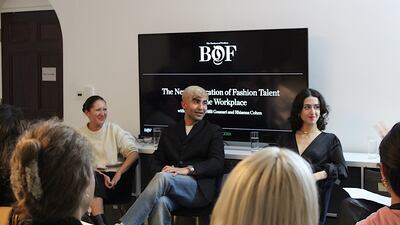
The Business of Fashion
Agenda-setting intelligence, analysis and advice for the global fashion community.

Agenda-setting intelligence, analysis and advice for the global fashion community.

Connect the next generation of fashion talent with your company’s job openings on BoF Careers today.
Gen-Z has entered the workforce, and as the largest generation, their presence and impact are only set to grow, steering workplace culture and employee expectations along the way.
Among what sets them apart from previous generations is their values-driven nature. For instance, one-third of people between the ages of 18 and 24 years-old would take a pay cut if it meant their jobs could contribute more meaningfully to society, according to a 2022 study by human resource consulting firm Randstad. Meanwhile, 77 percent of Gen-Z individuals surveyed by Deloitte in their “Welcome to Gen-Z” report believe it’s important to work at organisations which have values that align with their own.
Their preferred communication styles and methods, both in and out of the workplace, have been shaped by their upbringing as digital natives, further influenced by their education shifting into digital spaces throughout the Covid-19 pandemic. Indeed, 77 percent of Gen-Z individuals in hybrid roles would consider looking for another job if their employer asked them to work on site full-time, while 16 percent would immediately start looking for a new role.
ADVERTISEMENT

However, Gen-Z is not a monolith, and they are entering professional workspaces with a myriad of wants, needs and expectations from their employer. To explore those needs and help understand Gen-Z hiring challenges, The Business of Fashion held an intimate thought-leadership panel event at the Jimmy Choo Academy in London on November 1, with an audience of industry executives and HR leaders from the likes of Chanel, Threads Styling, LVMH, Karla Otto, Alexander McQueen, Burberry, House of Sunny, Margaret Howell, ASOS, Roksanda, Delos, Halfpenny, Fable & Mane and London College of Fashion, among others.
Moderated by BoF’s Alice Gividen, the panel of experts included Rhianna Cohen, creative director at creative strategy studio Mørning, whose clients include Nike, Snapchat and Calvin Klein; Pavel Dler, founder and CEO of Gen-Z media company Culted; and Erifili Gounari, founder of Gen-Z led social media marketing agency, The Z Link, and Forbes 30 Under 30 recipient.
Below, BoF shares the most compelling insights from the discussion, which centred around the realities of attracting and retaining top talent from the youngest generation in the workplace today.
PD: It’s important to understand how you can get the best out of these young individuals. Learn how you best communicate with them in the workplace, rather than be intimidated by it. We often change our processes and try different platforms of communication. It doesn’t cost us much to switch platforms or processes, nor is it lengthy. We can adapt and update those things within a day or two to better suit our team.
We like to be agile. Some employees are DMing me on Instagram or WhatsApp. This generation has ideas they want to share in their own flexible way and we are accepting of that, as a company. You don’t necessarily need to be active yourself in this way, but it’s important to be open to it.
Gen-Z are under so much pressure to save the planet, save the world and humanity. Sometimes, they just want to come to work and have a great time, do great work and not [have] that pressure.
EG: Gen-Z is used to efficient digital communication. Inefficiencies, like unnecessary meetings, really stand out to this cohort. Gen-Z will absolutely say, “why would we do that [meeting] if we can just do the same thing on Slack in 5 minutes?” If you can streamline your processes, these employees will be much more content.
RC: What we have learned as a team is that Gen-Z is keen to claim their work online, to use their digital identities to shout about their achievements and have that freedom in those spaces. It is such an important channel for their own self-expression and equality.
In terms of value exchange for us, they have been really important in building our brand. This generation has such a strong point of view on the trends we are tracking, so allowing them to bring that to work and seeing the value in letting them be themselves in those places is important.
ADVERTISEMENT
PD: It is really difficult to tick all the boxes and, often, I think that is something that you shouldn’t do as a business. You need to know what you stand for as an organisation and prioritise key values that you can absolutely take action on and routinely stand up for. Today, so many businesses try to have way too many values, and the individuals in your team can attest that it is not really authentic when you speak to them about it.
A priority should be having team members with great values that align with your business — and that the business’s own values align with them.
If you are preaching about being value-driven externally, but internally, the way you are interacting with Gen-Z and your workforce does not align with that — that eventually comes up.
EG: To discern what matters, you need to start internally. If you are preaching about being value-driven externally for marketing, but internally, the way you are interacting with Gen-Z and with your workforce does not align with that — that eventually comes up. Gen-Z are so good at spotting when a brand is or isn’t being authentic.
Starting externally is where most brands make mistakes. Try to start from within and see what values you actually want to stick to and why. Make sure that you can see how that reflects the people within your business and implement those strategies internally before you look at outward-facing initiatives.
RC: Rebellion fatigue was one of the trends that Mørning picked up on for our recent trend report. The social justice movement that happened during Covid-19 lockdowns in 2020 brought about a lot of performative action from brands that didn’t feel authentic to consumers. For Gen-Z, it’s all about true care and looking at various hygiene factors. In fashion, for example, that looks like ensuring your garment workers in factories are paid fairly. Those factories should be safe. This is simply an expectation.
PD: Value fatigue is a real thing. Gen-Z are under so much pressure to save the planet, save the world and save humanity. Sometimes, they just want to come to work and have a great time, do great work and not be given that pressure. Of course, we work to make sure we are there to support individuals and promote great values, but we also try to just give our team members a really enjoyable working environment.
EG: There are countless ways to interact with your team and make them feel like they are a part of the process. I was at a company where we would brainstorm on benefits we would like for the company to offer and, using an algorithm, they would rank the ideas. The top-ranked suggestions would be implemented within the business. For example, the business allocated a budget for houseplants so employees could improve their remote working experience.
Similarly, discover how Gen-Z would like to explore self-development. It’s essential to allocate budgets for this to your employees, to go to conferences, learn new skills, take online courses, do whatever they want to develop themselves. Some companies do that as well as offering coaching or therapy. It’s critical to be completely open to feedback, and support with personal growth and mental health, and incorporating these things in the company culture.
ADVERTISEMENT
Be really clear about where boundaries are set, to allow people to show up in the right way. This precedent has to be set by managers — to be honest, humble and fallible.
RC: We have to foster open environments — be really clear about where boundaries are set, to allow people to show up in the right way. This precedent has to be set by managers — to be honest, humble and fallible. If you’re not doing that as a manager, it’s hard to expect or ask anyone else to do this.
PD: It’s [also] important to also have Gen-Z in management roles, because if we don’t have Gen-Z in management roles, how do you expect to create an environment where individuals can take action on things or feel free to speak or relate to each other, and it goes to our content as well.
In the content that we produce, or when we consult brands, it’s really important to have the Gen-Z team members involved in the conversations, to make them feel heard and actually action those things.
RC: Really value what [junior talent] bring — it’s something I have learnt in collaborating closely with Gen-Z. They are increasingly aware and plugged into really valuable aspects of business, whether that is helping with their social media marketing strategies, feeding into future business objectives, or the future of what is happening within your business. Gen-Z really advocate for themselves because they really do know what’s up — we have to appreciate what they bring to the table.
PD: When we are recruiting, we always want to get to know the different applicants for a specific role and actually rarely look at their CV. Often, we give out a brief to really understand them, what they could bring to the company and what they would like to do here. Then, we often change the jobs based on what their interests are and try to make it as dynamic as possible.
We give them the opportunity to develop in the role — developing with us and utilising their skills and talent. Recently, as we launched a new beauty venture at Culted, my former executive assistant approached me with a deck showcasing her vision for the project. It was unprompted — she’s only 23 years-old. We have moved her from the executive assistant role and she is being developed, leading the strategy, creating viral videos for TikTok and generally flourishing.
EG: Make sure to add Gen-Z to the conversation in new ways. Think about how you can open the conversation up within the company — evolve their roles and responsibilities — to allow for their voice and their perspective and show that you care for it. Gen-Z brings such an interesting perspective to so many things. They have so many ideas, so much passion and creativity that it’s really nice to be able to allow that to flourish and actually actively do that. Make sure that the environment is open for that conversation to take place.
Discover the most exciting career opportunities now available on BoF Careers — including jobs from Tapestry, Alexander McQueen and Toteme.
A US regulator has banned most uses of the clauses, which started as a way for fashion companies to prevent senior executives from walking off with trade secrets, but have become a standard retention tool.
Check out this week’s new partners and openings on BoF Careers, the global marketplace for fashion talent.
BoF Careers provides essential sector insights for fashion designers this month, to help you decode fashion’s creative and commercial landscape.